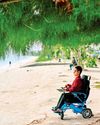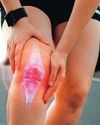
Since March 2022, Canadian couple Edith Lemay and Sebastian Pelletier and their four children have been on the move, taking in sights and sounds as they tour the world. From the dunes in Namibia and valleys in Kilimanjaro to dancing with the Maasai tribals in Tanzania, hot-air ballooning in Turkey and dressing up as a nomadic reindeer herder in Mongolia, it has not been merely a travel for leisure but one with a purpose. For Lemay and Pelletier, this journey is all about creating visual memories for their children. Memories-snapshots of our lived experience-are essential as they help connect our past with our present and prepare us for the future. And, Lemay and Pelletier are hoping these visual memories, carefully curated by them, may come handy for the children when they face the dark days ahead.
"Three of my children have retinitis pigmentosa (RP), a genetic disease without any cure as of now," Lemay told THE WEEK over a Zoom call from Thailand. "Our eldest kid, Mia, is 11 now. Then there is Leo, who is nine, Colin, who is seven, and Laurent, who is five. Leo is the only one who is not affected by RP."
Retinitis pigmentosa is a group of rare eye diseases that affect the retina. It makes cells in the retina break down slowly over time, causing vision loss. It is a disease that people are born with. Symptoms usually start in childhood, and most people eventually lose most of their vision. The retinal cells called rods and cones die in patients with RP because of a mutation in one of their genes. In a majority of cases, rods mainly located in the outer regions of the retina and responsible for peripheral and night vision-die down first. When more centrally located conduits also get affected, the patient with RP would face loss of colour perception and central (reading) vision, too.
This story is from the February 05, 2023 edition of THE WEEK India.
Start your 7-day Magzter GOLD free trial to access thousands of curated premium stories, and 9,000+ magazines and newspapers.
Already a subscriber ? Sign In
This story is from the February 05, 2023 edition of THE WEEK India.
Start your 7-day Magzter GOLD free trial to access thousands of curated premium stories, and 9,000+ magazines and newspapers.
Already a subscriber? Sign In

Walking in pine forest can have the same effect as a prescription drug
INTERVIEW - KATHY WILLIS, professor of biodiversity, the University of Oxford, and author, Good Nature

MORE THAN A HELPING HAND
Maria Victoria Juan spent a lifetime healing wounded soldiers, and she can't think of anything she could have done better

Against all odds
Mohamed Raishan Ahmed was born with spinal muscular atrophy, which made him unable to sit, stand or walk. Recently, the Maldivian underwent a rare, complex surgery in India that now allows him to sit upright. At 23, the fact that he is alive is in itself an achievement. But he has gone beyond mere survival-with a pursuit of excellence

A pacemaker tale
From science fiction to reality, with a touch of southern Indian wisdom

Driving safe
Taxi drivers endure gruelling hours, cramped seats and relentless traffic, making them prime candidates for health issues like back pain, hypertension, diabetes and insomnia.

Good food, good life
From the moment of birth, we establish a relationship with food—a nourishing link that requires care and attention to stay healthy

POOR SLEEP IN MIDLIFE COULD AGE YOUR BRAIN FASTER
PEOPLE WHO EXPERIENCE SLEEP ISSUES, such as difficulty falling asleep or staying asleep in their 40s, may show more signs of brain ageing in late midlife. Poor sleep may accelerate brain atrophy that is associated with dementia.

BRAIN SCANS SHOW MINDFULNESS MEDITATION CAN REDUCE PAIN
CAN MINDFULNESS MEDITATION actually relieve pain, or is it just a placebo effect?

NON-SURGICAL OPTION TO EASE KNEE ARTHRITIS
A NEW, MINIMALLY INVASIVE procedure called genicular artery embolisation (GAE) can effectively reduce pain, improve quality of life and reduce progression of the disease and the need for knee replacement surgery in people with knee osteoarthritis.

EARLY ONSET DIABETES, BELLY FAT LINKED TO DEMENTIA
FACTORS SUCH AS DIABETES and belly fat in midlife can put you at risk of dementia and Alzheimer's disease later in life.